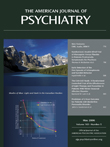Olfactory Identification Deficits in First-Episode Psychosis May Predict Patients at Risk for Persistent Negative and Disorganized or Cognitive Symptoms
Abstract
Objective: One-third of patients with a schizophrenia spectrum disorder have a measurable olfactory identification deficit at first examination. The authors studied the relationship of this deficit to symptom remission after 1 year of treatment. Method: Fifty-eight patients naive to antipsychotic medication who entered the Nova Scotia Early Psychosis Program were symptomatically rated with the Positive and Negative Syndrome Scale (PANSS) (at baseline and 1 year). At baseline, the University of Pennsylvania Smell Identification Test (UPSIT) was also completed. Remission was determined for four symptom factors derived from the PANSS (positive, negative, cognitive/disorganized, and anxiety/depression). Patients with and without remission were compared on UPSIT scores. Results: Patients with nonremission of negative and cognitive/disorganized symptoms had significantly lower baseline UPSIT scores compared with pateints with remission. UPSIT scores were unrelated to remission of positive or anxiety/depression symptoms. Conclusions: UPSIT scores can be used to identify patients at risk for persistent negative and disorganized/cognitive symptoms.



